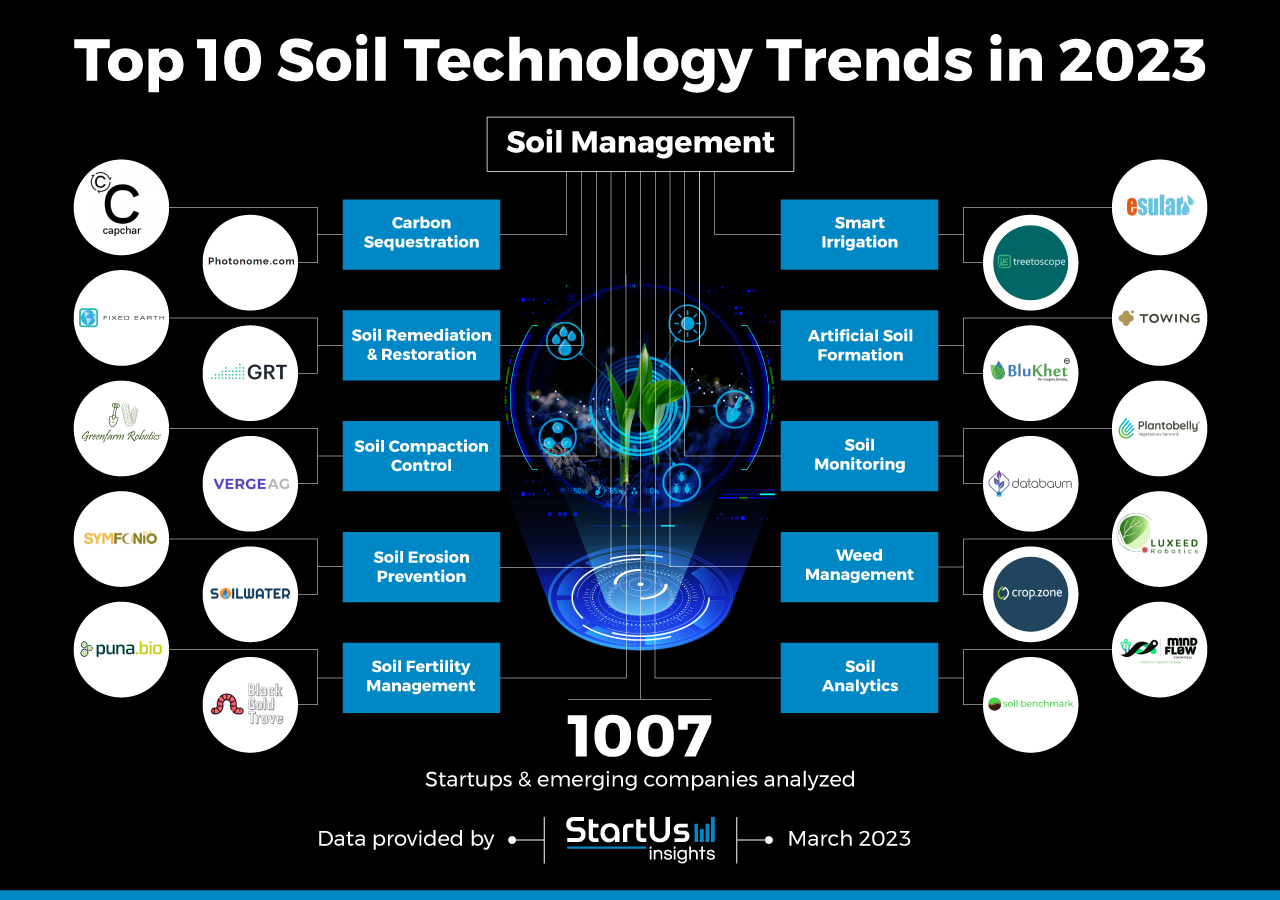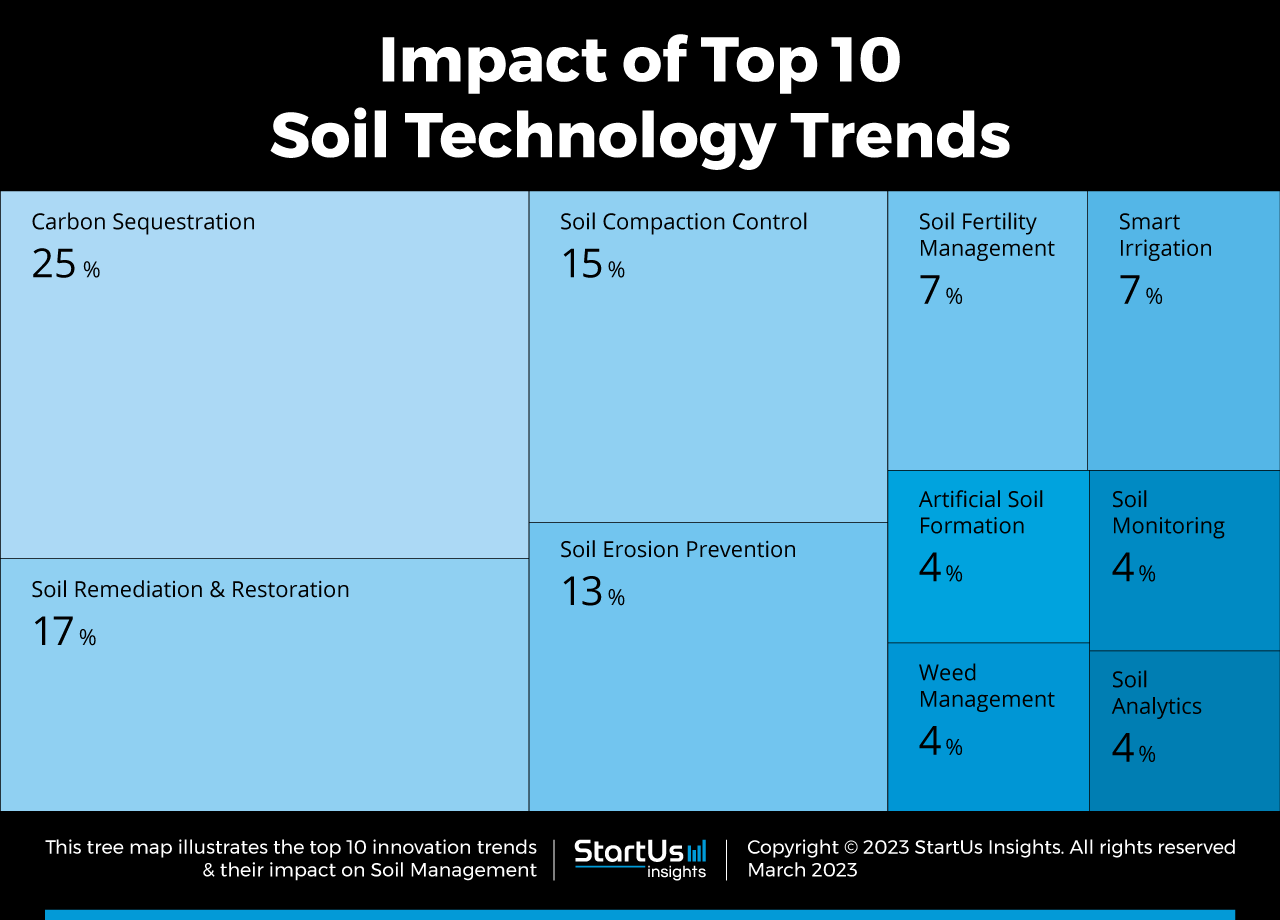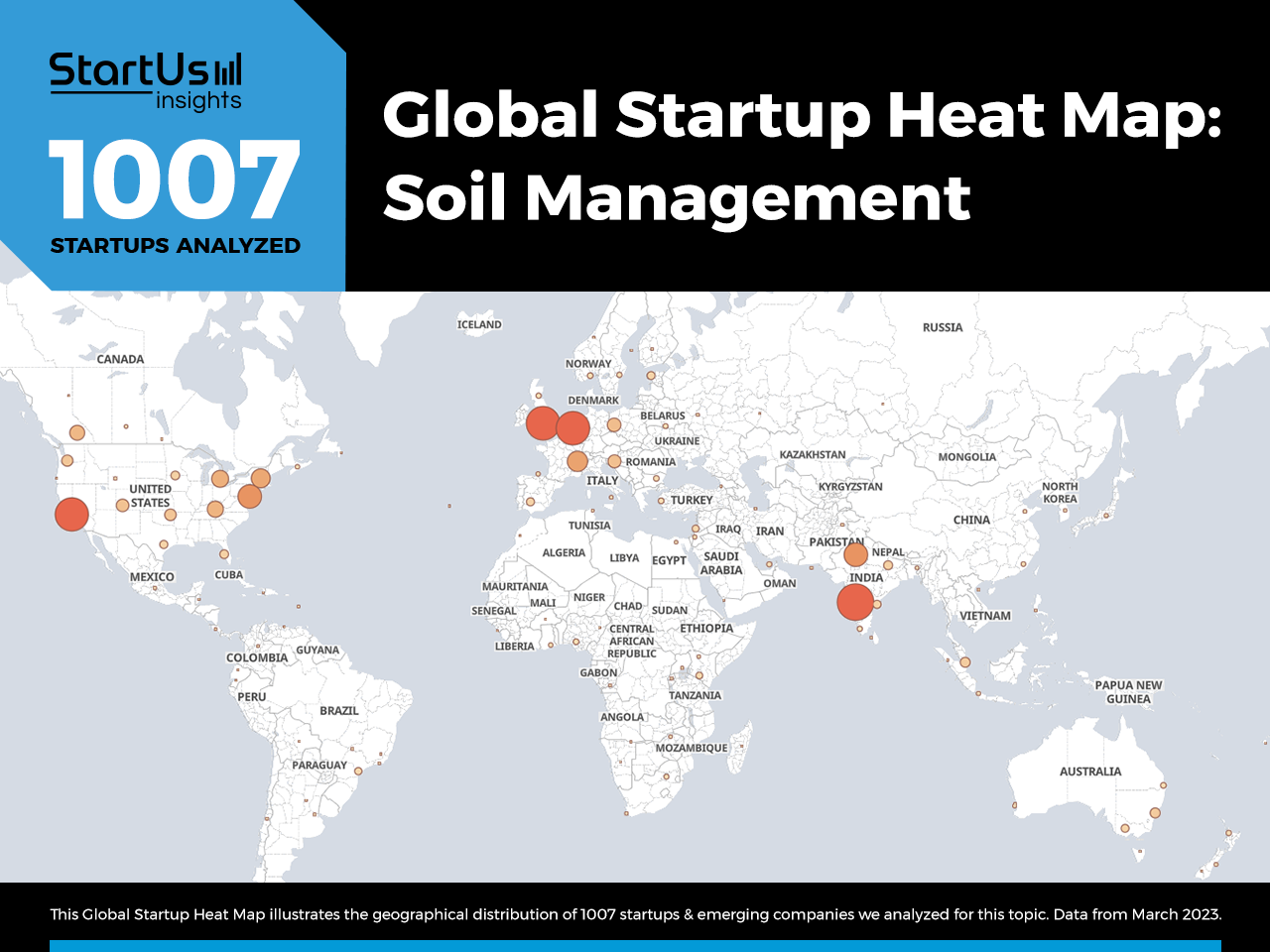Effective soil management ensures the long-term viability of food systems. Such practices promote healthy soil structure, increase soil fertility, and reduce the negative impact of farming on the soil. They also enable farmers to avoid soil erosion and replenish soil nutrients over time, ensuring a consistent yield. Additionally, soil management helps to control pests and diseases that negatively impact crops, reducing harmful chemical and pesticide applications. This research provides the top 10 soil technology trends in 2023 we found after analyzing 1007 startups and scaleups working in the field. These solutions range from carbon sequestration and soil remediation to weed management and soil analytics. Read more to explore all 10 trends and how they will affect your soil management strategies.
Innovation Map outlines the Top 10 Soil Technology Trends & 20 Promising Startups
For this in-depth research on the Top Soil Technology Trends & Startups, we analyzed a sample of 1007 global startups & scaleups. This data-driven research provides innovation intelligence that helps you improve strategic decision-making by giving you an overview of emerging technologies in the soil management industry. In the Soil Technology Innovation Map, you get a comprehensive overview of the innovation trends & startups that impact your company.
These insights are derived by working with our Big Data & Artificial Intelligence-powered StartUs Insights Discovery Platform, covering 3 790 000+ startups & scaleups globally. As the world’s largest resource for data on emerging companies, the SaaS platform enables you to identify relevant technologies and industry trends quickly & exhaustively.
Tree Map reveals the Impact of the Top 10 Soil Technology Trends
Based on the Soil Technology Innovation Map, the Tree Map below illustrates the impact of the Top Soil Technology Trends in 2023. Startups and scaleups are developing technological solutions for improving soil management and conservation. Carbon sequestration, soil remediation, and restoration techniques reduce the carbon footprint of farming and restore degraded soils. Soil compaction control, erosion prevention, and fertility management technologies maintain soil health and increase yields. Smart irrigation systems also optimize water usage, evading over-irrigation while ensuring the right amount of moisture for the soil. Artificial soil formation offers new alternative soils for farming and focuses on soil-less farming. Soil monitoring solutions allow farmers to track changes in soil quality. Additionally, weed management reduces weed growth and competition for nutrients while keeping away species that degrade soil health. Finally, analytics solutions provide information about soil quality, informing management decisions such as fertilization, crop selection, and remediation efforts.
Top 10 Soil Technology Trends in 2023
- Carbon Sequestration
- Soil Remediation & Restoration
- Soil Compaction Control
- Soil Erosion Prevention
- Soil Fertility Management
- Smart Irrigation
- Artificial Soil Formation
- Soil Monitoring
- Weed Management
- Soil Analytics
Global Startup Heat Map covers 1007 Soil Technology Startups & Scaleups
The Global Startup Heat Map below highlights the global distribution of the 1007 exemplary startups & scaleups that we analyzed for this research. Created through the StartUs Insights Discovery Platform, the Heat Map reveals high startup activity in the US and India, followed by the UK. Below, you get to meet 20 out of these 1007 promising startups & scaleups as well as the solutions they develop. These soil technology startups are hand-picked based on criteria such as founding year, location, funding raised, & more. Depending on your specific needs, your top picks might look entirely different.
1. Carbon Sequestration
Carbon sequestration enhances the ability of soils to absorb and retain carbon from plant biomass. Soil-based carbon sequestration also helps restore degraded soils, making the crops more resilient against both droughts and heavy rainfall. Soil management startups promote and incentivize soil-based carbon sequestration using various platforms to measure, monitor, verify, and reward farmers for adopting practices that increase soil carbon. Other startups connect farmers with buyers who pay for soil carbon credits as a way to offset their own emissions.
CapChar facilitates Soil Organic Carbon Sequestration
CapChar is a UK-based startup that uses pyrolysis kiln technology to produce biochar from low-grade wood chips. By sequestering biochar in the soil, the startup reduces greenhouse gas emissions and enhances soil fertility. CapChar’s proprietary kiln technology dries and pyrolyzes wet wood chips in a single vessel, producing high-quality biochar. CapChar’s biochar farming allows landowners, farmers, and businesses to reduce their carbon footprint and enhance soil health.
Photonome advances Microbial Soil Sequestration
US-based startup Photonome develops natural consortia of microbes that farmers use as a molecular cover crop. These microbes fix nitrogen, sequester soil carbon, and improve soil health by enhancing nutrient availability and water retention. Farmers mix the microbes in the soil post-harvest to gain these agronomic benefits. The microbes then sequester atmospheric carbon during the growing season and store it in the soil as organic matter, reducing greenhouse gas (GHG) emissions and improving crop yield. This solution provides farmers with a low-cost, environmentally friendly, and scalable way to improve crop yields and soil quality. It also reduces greenhouse gas emissions and fertilizer inputs.
2. Soil Remediation & Restoration
Contamination of soil occurs due to anthropogenic activities such as industrial processes, improper disposal of hazardous wastes, and agricultural practices. Startups develop innovative solutions, such as bioremediation and phytoremediation, to break down contaminants in the soil and restore soil structure and microbial diversity. Some startups are also working on nano remediation using nanoparticles or nanomaterials and electrokinetic remediation using electric currents to decontaminate soil sources. In urban areas where heavy metals and other pollutants contaminate the soils, farming poses a risk to human health. Soil remediation and restoration help reduce these risks and improve public health whilst ensuring better yields.
Fixed Earth Innovations offers Microbial Soil Remediation
Fixed Earth Innovations is a Canadian startup that makes a microbial soil remediation solution. The startup utilizes specially engineered microbes to degrade pollutants and enhance soil fertility. To restore soil microbial health, the startup tailors microbial deployment on a site-specific basis, and farmers apply it to their soils. The solution remediates hydrocarbons, salinity, sulfolane, and per- and polyfluoroalkyl substances (PFAS) in the soil. Fixed Earth Innovations’ solution thus reduces environmental liabilities, improves crop yields, and saves costs compared to conventional soil remediation.
GRT provides Soil Washing Facilities
Canadian startup GRT specializes in soil remediation for construction sites. The startup leverages a patented technology that washes, sorts, and reuses excess or contaminated soils that would otherwise go to landfills. At its resource regeneration plant, GRT washes the soil with water, screens it, and sorts the soil into different components, such as rocks, gravel, sand, and clay. It then reintegrates the clean soil and components into various construction projects rather than discarding them as waste. GRT’s soil-washing technology reduces environmental impact, saves disposal costs, and creates clean construction aggregates for builders.
3. Soil Compaction Control
Compacted soil reduces water infiltration, root growth, crop yield, and quality, as well as increases erosion and runoff. Soil compaction control innovations improve the water-retention capacity of soil by avoiding or reducing soil compaction. Farmers and landowners also use controlled traffic farming (CTF) wherein farmers limit heavy machinery traffic to specific lanes within a field, reducing soil compaction. Startups are developing autonomous or semi-autonomous vehicles that perform precision farming tasks without compacting the soil. New techniques, such as soil aeration, allow air, water, and nutrients to penetrate the soil more easily and reduce compaction.
Greenfarm Robotics develops a Compaction Control Robot
Greenfarm Robotics is a French startup that makes a cable-driven robot to make farming more sustainable and reduce soil compaction. The robot covers a farm and performs various farming operations from the sky down using winches on top of masts and cables. It works on any soil type and slope as well as operates automatically according to weather and time conditions. The compaction control robot thus reduces the amount of chemical application needed to grow crops and solve issues of soil compaction, improving crop quality and yield. This robot offers a cost-effective, modular, and efficient way for farmers and landowners to reduce foot and tire traffic on the soil and hence maintain soil health.
Verge Agriculture aids Farm Path Planning
Canadian startup Verge Agriculture offers Launch Pad, an interactive platform for path planning and optimization on farms. It combines geospatial intelligence and path-planning simulations for workers and robots. After the creation of soil maps, the platform enables farmers to modify and optimize these track layouts to best fit their individual requirements. As a result, Verge Agriculture’s solution helps farmers plan their field operations efficiently and reduce foot traffic. This reduces input costs, soil compaction, and erosion.
4. Soil Erosion Prevention
Preventive measures against soil erosion protect the soil from water and wind erosion that degrades its quality and productivity. In recent years, startups have been developing materials from biodegradable sources, such as coir mats, straw wattles, and jute nets, to reduce erosion. These biodegradable erosion control blankets stabilize the soil surface and reduce erosion. Startups are also working on technologies like hydroseeding wherein farmers spray a slurry of seeds, fertilizer, and mulch onto bare soil using a high-pressure hose. The mixture anchors the seeds to the soil and provides a protective covering that prevents erosion. Tackling soil erosion preserves soil fertility, improves water quality, reduces flooding risk, and protects the environment and natural habitats.
SymFonio grows an Erosion-Prevention Grain
SymFonio is a Dutch startup that offers Fonio, an agricultural grain cultivated in Africa to counteract soil erosion. Fonio is a nutritious and gluten-free grain that grows on sandy soil without fertilizers or pesticides. Its cultivation counteracts desertification and erosion due to its deep-root system. Fonio also features a short growing season and tolerates drought and other harsh environmental conditions. SymFonio offers farmers a sustainable and profitable way to combat soil erosion and desertification while providing a high-value and drought-resistant crop.
Soilwater provides a Soil Flocculant Conditioner
UK-based startup Soilwater offers Rescaype, a soil erosion control solution for agriculture and horticulture. It is a micronized and biodegradable version of lanthanum-modified polyacrylamide (la-PAM), a food-grade polymer that flocculates soil particles and improves soil structure. When mixed with soil, Rescaype helps retain soil moisture and nutrients, reduces runoff and leaching, as well as increases crop yields and quality. This mitigates the effects of droughts and floods. The startup helps farmers and land managers reduce erosion and eutrophication, saving money and also improving soil productivity.
5. Soil Fertility Management
By using soil fertility management technologies and techniques, farmers enhance soil productivity and fertility. Landowners are using biofertilizers that contain beneficial microorganisms to improve soil fertility. They increase the availability of nutrients such as nitrogen, phosphorus, and potassium. These additives also improve soil structure, health, and resilience by enhancing plant tolerance to salt and drought stress. Additionally, soil enhancers improve fertility by providing essential micronutrients, organic matter, and growth regulators to plants. Startups derive these enhancers from natural or synthetic sources and apply them via foliar sprays or soil amendments. These additives increase the efficiency and eco-friendliness of soil fertility management practices.
Puna Bio delivers Soil Enhancement Bioinoculants
Puna Bio is an Argentine startup that develops biological inputs for soil enhancement. These bioinoculants and bio fungicides enhance soil fertility, increase crop yields, reduce fertilizer use, and restore degraded soil affected by salinization or erosion. Puna Bio isolates and formulates ancient microbes known as extremophiles that promote growth under the most extreme conditions. Farmers use it for seed treatment to significantly increase root mass, length, and density, improving soil health and resistance at the same time.
Black Gold Trove offers Organic Worm Casting
US-based startup Black Gold Trove provides organic and natural worm castings for soil fertility management. Vermicompost uses the excreta of earthworms to enrich the soil with nutrients and beneficial microorganisms. The startup raises worms and produces high-quality worm castings that are free of pesticides, chemical additives, and genetically-modified organisms (GMOs). This vermicompost is an eco-friendly and effective alternative to commercial fertilizers to improve plant growth and soil fertility.

6. Smart Irrigation
Smart irrigation practices and technologies optimize water use and crop yield by adjusting irrigation schedules and amounts based on soil conditions and plant needs. This prevents over-irrigation, salinization, nutrient leaching, and waterlogging. Additionally, smart irrigation reduces water consumption and energy costs. Startups are developing innovative solutions for smart irrigation using sensors, drones, artificial intelligence, and cloud computing. These technologies enable real-time monitoring and control of irrigation systems as well as provide data analysis and decision support for farmers.
Esular simplifies Irrigation Zone Control
Esular is a Turkish startup that provides a smart irrigation system for farmers and landowners. It uses wireless battery-operated sensors to collect data on soil moisture, weather conditions, and crop growth. Using AI, the system analyzes the data and automates irrigation accordingly through its valves. Esular’s mobile and web applications allow farmers and businesses to remotely control their irrigation systems, monitor land conditions, and reduce water consumption. Esular’s smart irrigation system thus enables farmers to optimize irrigation and conserve water while providing the convenience of remote monitoring.
Treetoscope advances Direct Plant Sensing
Israeli startup Treetoscope offers a software-as-a-service (SaaS) irrigation management platform using direct plant sensing technology. Using its biosensors, Treetoscope measures the real-time water consumption and irrigation needs of crops. The platform also integrates the plant sensor, soil, satellite, and real-time weather data and applies AI to drive farm and field-level irrigation decisions. Consequently, Treetoscope’s solution provides farmers with irrigation insights and improves soil stress level management. By continuously monitoring, Treetoscope’s solution provides valuable data for optimizing crop health and productivity while saving water costs.
7. Artificial Soil Formation
Artificial soil formation enables agriculture in urban environments where natural soils are inadequate or contaminated. Farmers use biogeochemical interfaces that startups create by mixing mineral materials, organic matter, and microorganisms to support vegetation growth and soil functions. Startups are using soil alternatives, such as peat and coir, to reduce soil use for small-yield agriculture and allow time for the soil to heal. Soil-less farming techniques, such as hydroponics and aquaponics, utilize water or other substrates instead of soil to grow plants, often in controlled environments like vertical farms. These artificial soil or soil alternatives also create a barrier between contaminated soil and plants, reducing exposure to pollutants.
TOWING develops a Carbon-Based Artificial Soil
TOWING is a Japanese startup that develops Soratan, a carbon-based artificial soil for agriculture. It consists of plant residue biochar, charcoal, and microbes. This artificial soil converts organic fertilizers into inorganic nutrients, creating good soil conditions and fixing carbon dioxide. The acidity of the soil is close to neutral, unlike regular alkaline biochar, making it more suitable for long-term agriculture. TOWING’s soil provides farmers with a cost-effective solution to improve soil quality, enhance nutrient absorption, and boost crop yield.
BluKhet provides Hydroponic Farms
Indian startup BluKhet offers hydroponic solutions for soil-less farming. The startup designs, constructs, and operates hydroponic farms fully automated with IoT-based temperature control and nutrient dosing systems. These farms consume less water than traditional farming and produce higher yields in wasteland regions. The startup’s micro farms operate with minimal labor dependency and without the use of harmful chemical pesticides or fertilizers. BluKhet’s farms enhance soil conservation, reduce nutrient loss, and prevent soil-borne diseases.
8. Soil Monitoring
Soil monitoring technologies enable farmers to collect and analyze data on various soil parameters, such as moisture, temperature, pH, nutrients, organic matter, and microbial activity. This helps farmers and land managers to optimize their soil health and productivity, as well as detect and prevent soil degradation, erosion, nutrient depletion, or contamination. Many startups are developing innovative solutions, such as IoT sensors and soil monitoring drones, to provide accurate, timely, and affordable soil information. They also leverage machine learning algorithms and robotics to access real-time data on soil quality, leading to more efficient use of resources and higher crop yields.
Plantobelly develops an Autonomous Soil Moisture Sensor
Plantobelly is a German startup that provides a soil monitoring sensor for urban greening and agriculture. The startup’s wireless sensor measures soil moisture at different depths and transmits the data to a web platform. The platform displays the soil moisture level over time graphically and provides drought warnings to help in decision-making for urban planners and farmers. It also displays weather data and optimized watering plans. A single sensor also measures soil moisture for multiple trees. Plantobelly’s sensor mitigates the need for multiple sensors, saves resources, as well as improves plant and soil health.
databaum aids Remote Soil Health Monitoring
Swiss startup databaum offers remote soil health monitoring sensors. They monitor soil moisture, electric conductivity, temperature, and salinity, as well as air temperature, humidity, pressure, and rainfall. The sensors leverage low-power wide area networking (LoRaWAN) for data transmission and send data at fixed intervals. It also features a long maximum line-of-sight transmission distance, providing flexibility and adaptability for farmers with varying land sizes and locations. databaum’s web platform further provides access to real-time information and customized alerts based on this data. This enables farmers to act immediately in case of irregularities and also helps to avoid damages from overwatering or drainage issues.
9. Weed Management
Weed management is crucial for soil management as the roots of weeds are often shallow, causing soil erosion and competition for moisture and nutrients with desirable plants. Also, some allelopathic weeds release chemicals into the soil that inhibit the growth of other plants. This causes changes in the microbial community in the soil, affecting soil health. Startups are developing more innovative approaches to weed management utilizing drones, sensors, robotics, and AI. These technologies help farmers monitor weed infestations, identify weed species, and apply targeted treatments with minimal herbicide use. Startups are also working on soil-based weed control measures, like nanomaterial herbicides and organic mulching, to reduce sunlight and water available to weeds. These solutions improve weed control efficiency, reduce costs, preserve soil health, and lower environmental impacts.
crop.zone provides Hybrid Herbicide Technology
German startup crop.zone creates a residue-free weed management solution for agriculture. It uses a hybrid herbicide technology to combine electric current and a conductive liquid to disrupt the water supply of weeds and dry them out. Farmers use a tractor to provide the mechanical energy, which a generator then converts to electrical power. The startup sprays its conductive fluid, volt.fuel, onto the weeds, and current passes through them using an applicator. The current passes through the roots of the weeds. crop.zone’s technology is a competitive alternative to conventional chemical methods, which require minimal energy consumption, no soil disturbance, and no residues. This hybrid herbicide technology reduces the need for harmful herbicides that have adverse effects on soil health and biodiversity.
LUXEED Robotics makes Laser-based Weeding Technology
LUXEED Robotics is a Lebanese startup that develops Ultron, a chemical-free weeding robot. It utilizes a localized laser beam to eliminate weeds in the crop with higher accuracy, avoiding the need for weedicides. This heat damages the cellular structure of the weed, causing it to die. Ultron also combines AI algorithms and cameras to detect visible weeds and leave the actual crop unharmed. Laser-powered weeding is a non-contact method that does not disturb the soil, preserves soil health, and reduces manual weeding costs. It also increases the quality of the yield and reduces the possibility of soil contamination due to leaching.
10. Soil Analytics
Soil analytics techniques analyze soil samples for various soil properties and health indicators. They include gas chromatography, mass spectrometry, microbiome analysis, and X-ray fluorescence analysis, among others. Such solutions provide insights into spatial and temporal variations of soil characteristics across different regions and seasons. Startups are developing software and hardware to determine the chemical and physical properties of soil, such as nutrient content, pH, and organic matter content. Some soil management startups are creating cloud-based platforms powered by big data and advanced analytics that allow farmers to store and analyze soil data from multiple sources in one place. They provide insights to make informed decisions to improve soil management practices.
MindFlow Genomics facilitates Soil Microbiome Analysis
Belgian startup MindFlow Genomics provides precision biological diagnostics for soil health analysis. The startup samples soil, analyzes it via next-generation sequencing (NGS), and provides data-driven indicators for bio-fertilizer optimization. It then generates a set of assertive indexes for decision-making in the field on the basis of soil microbiome DNA sequencing. This allows MindFlow Genomics to identify specific microbial strains that are important for promoting soil health and fertility, as well as for controlling pests and diseases.
Soil Benchmark develops Soil Analysis Software
Soil Benchmark is a UK-based startup that provides soil analysis software to help farmers optimize their soil management practices. By combining data on soil type, topography, climate, and farm history, the software allows farmers to visualize and analyze data to make informed soil management decisions. It also enables landowners to compare the outputs of different soil management practices and benchmark them against each other to choose optimum techniques for future use. Soil Benchmark’s data-driven tools provide practical insights that simplify the process of soil analysis and increase crop performance.
Discover all Soil Technology Trends, Technologies & Startups
The future of soil management is crucial for sustainable agriculture and food production. However, soil degradation is a serious threat to food security and ecosystem services. To address this challenge, startups are working on innovative solutions such as biodegradable films that cover the soil as well as reduce water evaporation and weed growth. Microbial inoculants are also a point of interest for landowners and farmers to enhance soil fertility and plant health by increasing nutrient availability and disease resistance. Further startups are developing nanoscale agrochemicals that target specific tissues or organisms and release nutrients or pesticides in a controlled manner. The Soil Technology Trends & Startups outlined in this report only scratch the surface of trends that we identified during our data-driven innovation & startup scouting process. Identifying new opportunities & emerging technologies to implement into your business goes a long way in gaining a competitive advantage.











